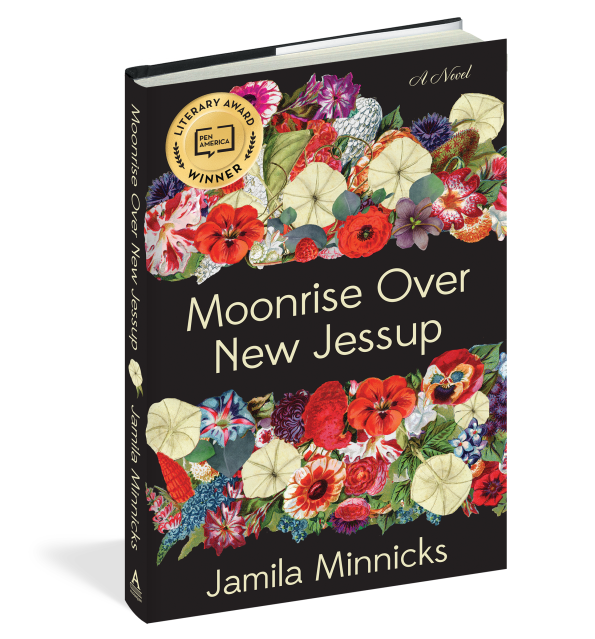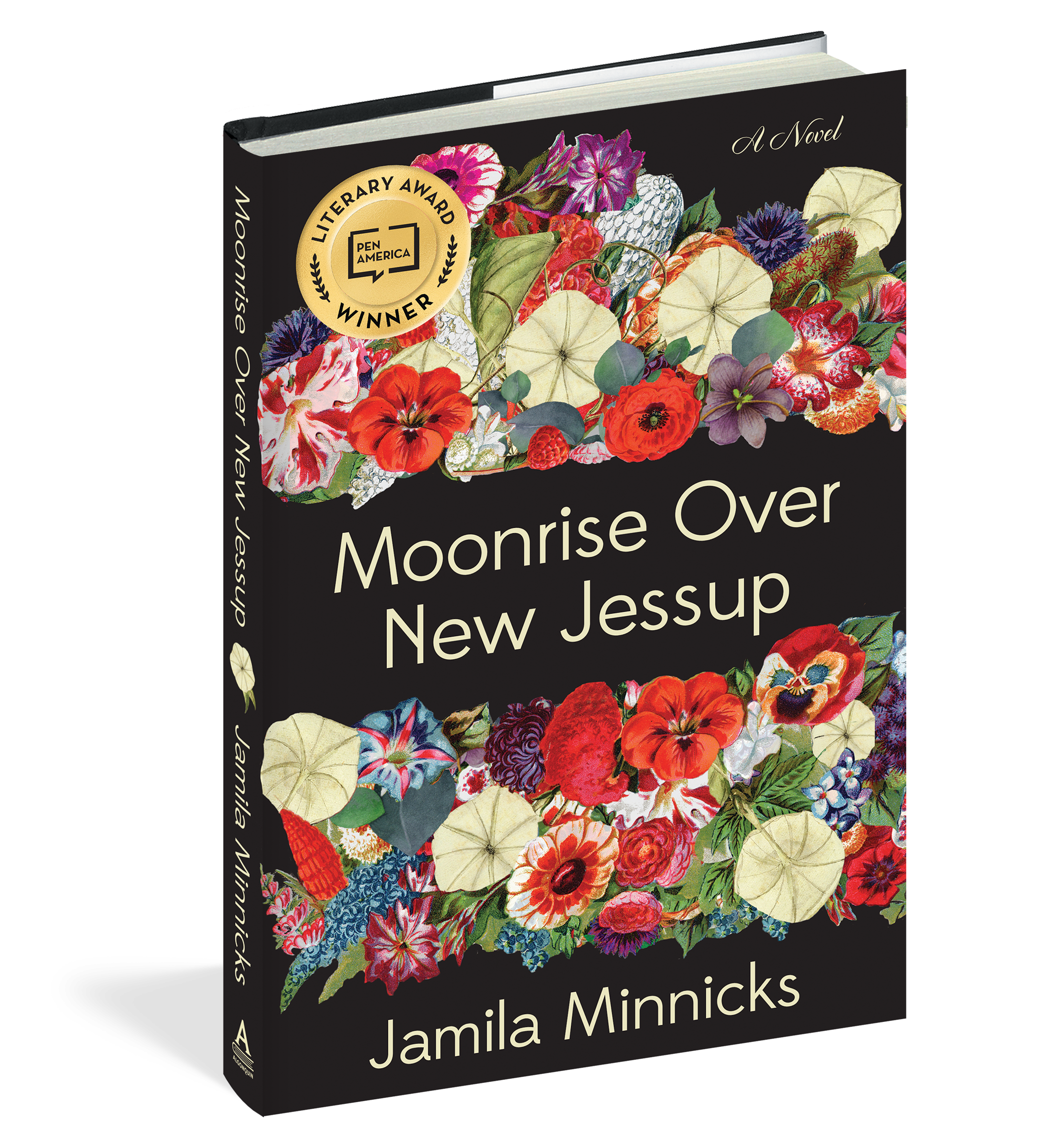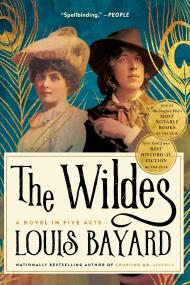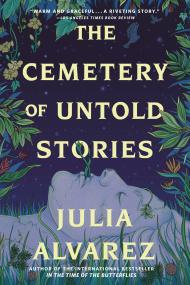By clicking “Accept,” you agree to the use of cookies and similar technologies on your device as set forth in our Cookie Policy and our Privacy Policy. Please note that certain cookies are essential for this website to function properly and do not require user consent to be deployed.
Moonrise Over New Jessup
A Novel
Contributors
Formats and Prices
- On Sale
- Jan 10, 2023
- Page Count
- 336 pages
- Publisher
- Algonquin Books
- ISBN-13
- 9781643752464
Price
$28.00Price
$35.00 CADFormat
Format:
- Hardcover $28.00 $35.00 CAD
- ebook $11.99 $15.99 CAD
- Audiobook Download (Unabridged) $27.99
- Trade Paperback $18.99 $24.99 CAD
This item is a preorder. Your payment method will be charged immediately, and the product is expected to ship on or around January 10, 2023. This date is subject to change due to shipping delays beyond our control.
Buy from Other Retailers:
Winner of the PEN/Bellwether Prize for Socially Engaged Fiction, an enchanting and thought-provoking debut novel about a Black woman doing whatever it takes to protect all she loves on Alabama soil during the Civil Rights Movement.
It’s 1957, and after leaving the only home she has ever known, Alice Young steps off the bus into all-Black New Jessup, where residents have largely rejected integration as the means for Black social advancement. Instead, they seek to maintain, and fortify, the community they cherish on their “side of the woods.” In this place, Alice falls in love with Raymond Campbell, whose clandestine organizing activities challenge New Jessup’s longstanding status quo and could lead to the young couple’s expulsion—or worse—from the home they both hold dear. As they marry and raise children together, Alice must find a way to balance her undying support for his underground work with her desire to protect New Jessup from the rising pressure of upheaval from inside, and outside, their side of town.
Based on the history of the many Black towns and settlements established across the country, Jamila Minnicks’s heartfelt and riveting debut is both a celebration of Black joy and a timely examination of the opposing viewpoints that attended desegregation in America.
Longlisted for The Center for Fiction 2023 First Novel Prize
-
Finalist for the Center for Fiction First Novel Prize
2023 Southern Literary Review Book of the Year
Winner of the 2024 BCALA First Novelist Award
Named a Best/Most Recommended Book of January/2022 by the Chicago Review of Books and The Rumpus -
“I was awestruck by its beauty, rapt by its originality, and astounded by its depth. But what astonished me most was learning that this is a debut. The craftwork is extraordinary. Was this book dreamed into existence? Did the Ancestors themselves place this story in the writer’s mind? From page one, I knew this work would transform me. It expanded the way I imagine what is possible in the art form. More than interesting, it is integral. More than important, it is inspiring. Read this book. Cherish it. Protect it. You must. Right out of the gate, Jamila Minnicks’s Moonrise Over New Jessup is a masterpiece.”Robert Jones, Jr., author of The New York Times bestselling novel, The Prophets
-
"My favorite novels light up my brain with things I hadn’t considered before – and this one does exactly that. The deep complexity of the American Civil Rights movement; the various, sometimes opposing approaches of its leaders to desegregation; the gains and inevitable casualties that social progress can claim. With compelling characters and a heart-pounding plot, Jamila Minnicks pulled me into pages of history I’d never turned before."Barbara Kingsolver
-
"Elegant and nuanced, Moonrise Over New Jessup is an incandescent work of art through-and-through, from a powerful new voice."Jason Mott, author of National Book Award winner Hell of a Book
-
"An immersive and timely recasting of history by a gloriously talented writer to watch. You will fall in love with New Jessup: the town and the book."Margaret Wilkerson Sexton, author of The Revisioners
-
“Moonrise over New Jessup is a tender and beautifully written debut that shines light on the untold stories of the women who supported the foot soldiers of the bourgeoning civil rights movement. Warm and affecting, this book will draw you in with its heart.”Heidi W. Durrow, author of the New York Times bestseller The Girl Who Fell from the Sky
-
"Alice's voice, her witty, generous, keenly observant, utterly compelling voice, will be with me for a long time. And the world of New Jessup that she evokes -- not just her beloved, Raymond, and his family, but the whole community, each character so vividly drawn, from Miss Vivian to Patience to the ghost of Rosie, who hovers, for Alice, behind so much -- that too is now part of my lived experience, as well as their struggles to preserve the integrity and autonomy of New Jessup in a period of great transition, to ensure a fully independent thriving Black community -- it's a complex history I didn't know, and Jamila Minnicks brings it alive so powerfully. This beautiful novel deserves, and I'm sure will find, many readers."Claire Messud, author of The Burning Girl
-
“No one who's read Zora Neale Hurston ever forgets her Eatonville. So too will Jamila Minnicks’s New Jessup live on in the American imagination as both a place and an idea. Moonrise Over New Jessup is a staggeringly beautiful love letter to Blackness -- particularly southern Blackness -- that celebrates the joys, sadness, and multiplicity of existence outside the white gaze. An absolute triumph, Moonrise Over New Jessup confirms a major voice in Jamila Minnicks, a writer everyone should be watching.”Dionne Irving, author of The Islands
-
“The novel delves smartly into the distinction between the fight for equal rights and the fight for integration … Minnicks provides a nuanced and realistic portrayal of the personal costs of fighting for change.”The New York Times Book Review
-
"An outstanding writer, Minnicks excels at capturing the atmosphere and issues of a specific locale at a particular time, the Deep South at the dawn of the civil rights era. This highly recommended title is an excellent choice for book discussion groups and would make a great movie.”Library Journal
-
“A warmly appealing book debut” with “impassioned characters. A thoughtful look at a complex issue.”Kirkus Reviews
-
“Jamila Minnicks has written an unforgettable debut, and announced herself as a writer to watch for years to come.”Chicago Review of Books, "12 Must-Read Books of January 2023"
-
"A thought-provoking and enchanting debut."The Rumpus, "The Most Beautiful Books of 2022"
-
“In an evocative and ambitious novel, Minnicks, a former lawyer, presents a fresh look at desegregation in Alabama… Moonrise Over New Jessup triumphs in its quest to offer a provocative perspective on racial justice, sovereignty and joy.”Ms.
-
“Warm moments of Black joy are well balanced by the weighty tension threaded throughout this debut to create historical fiction worth picking up.”BuzzFeed
-
“An enlightening look at Black communities in the 1950s and '60s that saw a better future without racial integration… Reading Moonrise Over New Jessup reminds us of the way that history gains a buffed gloss when we condense it into smooth movements. Minnicks' novel keeps us from losing sight of how foggy the path forward actually was.”Minneapolis Star-Tribune
-
“Moonrise Over New Jessup highlights an important part of history while exploring themes of acceptance, independence, and identity… Against the backdrop of a period of racial unrest in the late 1950s and early 1960s, the novel boldly questions the value of integration and acceptance if it means losing the comfort that separation has created… Moonrise Over New Jessup reminds us that history is not a monolith, but is experienced by individuals and communities in different ways, mirroring the conflict and contradictions of everyday life.”Southern Review of Books
-
“A beautifully written novel that is heavily character-driven and slow-paced, while simultaneously providing enough interest and originality to keep readers turning pages.”BookReporter
-
“Romantic love, familial love, and the love of place play out against the background of late 1950s – early 1960s civil rights era… A beautifully written exploration of just some of the variety of opinions within the civil rights era Black community on freedom, equality, and safety.”The Southern Bookseller Review
-
“An absolutely breathtaking debut that celebrates Blackness in all of its triumphs. Both an in-depth exploration of all-Black towns and a love story all the same, Jamila Minnicks has written a stunning and poignant modern classic.”—Bookmarks, Winston-Salem, N.C.Shelf Awareness, IndieBound
-
“A beautifully written, thought-provoking novel about courageous people at the cusp of historical changes. As compelling as the plot is and as intriguing as the characters are, the excellence of the writing itself should not be overlooked. This is an important book, well-structured with beautifully crafted language. Moonrise over New Jessup deserves a large audience.”Southern Literary Review
-
"This is a beautifully written and thought-provoking debut."Book Riot
-
"Minnicks’s acclaimed debut novel scrutinizes the meaning of freedom and the price of change."New York Times Book Review
-
"Rendered in lush, exquisite prose, Moonrise Over New Jessup revels in the turbulent underbelly of the politics of love."Electric Literature, "Electric Lit's Best Novels of 2023"
-
"The first-person narration, with its authentic regional dialect, infuses this novel with fresh appreciation for those who struggled for racial equality"Cheryl McKeon, Book House of Stuyvesant Plaza, Albany, N.Y., Shelf Awareness
-
“Beautiful imagery and writing... Minnicks’ characters are completely realized and mostly sympathetic, the plot elucidating. This Pen/America award winner would make for stimulating discussion.”Denver Post
Newsletter Signup
By clicking ‘Sign Up,’ I acknowledge that I have read and agree to Hachette Book Group’s Privacy Policy and Terms of Use









